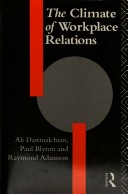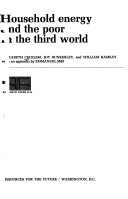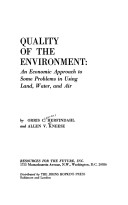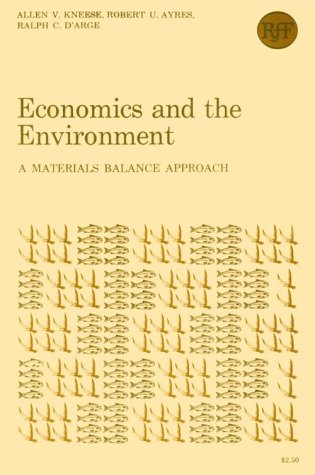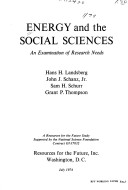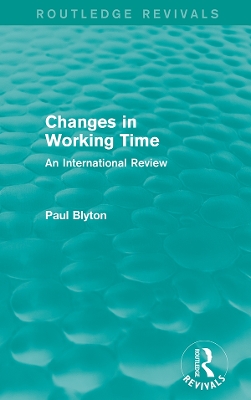Routledge Revivals
11 total works
The World Rubber Industry
by Colin Barlow, etc., Sisira Jayasuriya, and C. Suan Tan
The Climate of Workplace Relations
by Ali Dastmalchian, etc., Paul Blyton, and Ray Adamson
This book should be of interest to lecturers and students of industrial relations, human resource management and organization studies.
Public agencies and industry will probably spend tens of billions of dollars on new water pollution abatement facilities in the next few decades. Added billions will be spent for the operation of new and existing facilities. How can physical science research reduce the cost of achieving objectives? And how can social science research make sure that the right objectives are being efficiently pursued? This title, first published in 1962, is directed to the orientation of the research effort, and the tool used for this purpose is an economic framework. This book will be of interest to students of economics and environmental studies.
Household Energy and the Poor in the Third World
by Elizabeth Cecelski and etc.
This volume originated as a report given to the World Bank in 1978 on the household energy consumption of both the urban and rural poor in developing countries. Originally published in 1979, this title supplies alternatives for meeting the domestic energy needs of the poor in developing countries and looks at the results of experiments in introducing new forms of energy. This book is a valuable resource for public policy makers and students interested in environmental studies and developmental studies.
Investment Decisions in Advanced Manufacturing Technology
by Magdy G. Abdel-Kader, etc., David Dugdale, and Peter Taylor
Contemporary society is dependent on man's ability to work fundamental changes in the natural environment. In using resources to produce high and rising levels of income, however, effects are often produced that are incidental to the main purpose. This study, first published in 1965, explores some research approaches to the economic analysis of some of the key environmental problems, including water and air pollution, the introduction of chemical substances into the environment and the development of urban and rural space. This title will be of interest to students of environmental studies and economics.
This monograph length report, first published in 1970, originated from a program of research at Resources for the Future that dealt with the management of residuals and of environmental quality. It presents some of the broad concepts that the program was based on and represents the effort to break out of the traditional approach in pollution and policy research, which had treated air, water, and solid waste problems as separate categories. This book will be of interest to students of economics and environmental studies.
Originally published in 1974, this report dwells on the problems of meeting global energy demands and the time, effort and knowledge needed to research new energy methods. With rising costs, the uncertainty of supply from the Middle East and concern over the environmental impact of energy products, Energy and the Social Sciences outlines the intense need for well-designed research. This title will be of interest to students of Environmental Studies.
This re-issued work, first published in 1980, represents a work of normative political philosophy which argues positively for the centrality of the obligation to meet the various demands of social need in our society, and will be of particular interest to students of politics, philosophy, social politics and administration.
Bringing the insights of analytical Political Philosophy to bear on the issues of social welfare and welfare provision, the authors discuss such issues as the basis of the sense of stigma involved in the receipt of welfare benefits, the right of welfare and the concepts of 'community'.
European Integration and Nordic Alcohol Policies
by Harold D. Holder, etc., Eckart Kuhlhorn, Sturla Nordland, Trygve Ugland, and Esa Osterberg
First published in 1985, this book examines the major components of working time from an international perspective, considering the individual aspects of working time, with particular emphasis on the argument that work should be shared to alleviate unemployment and the case for further increasing the flexibility and choice in working arrangements. Paul Blyton reviews working time since the Industrial Revolution, when a strict time-frame was first imposed on workers, and the growth in work-sharing, flexitime, part-time working and changes to the retirement age.

